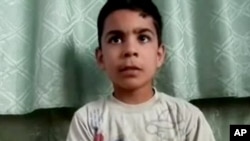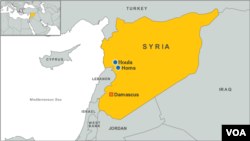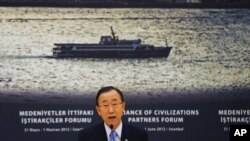Rights activists say Syrian forces have again attacked the central area of Houla where more than 100 people were massacred last week.
The head of the Syrian Observatory for Human Rights, Rami Abdel Rahman, told VOA Thursday that three people were killed in overnight shelling by government troops. He said a 14-year-old boy was killed later by sniper fire.
Damascus-based United Nations spokeswoman Sausan Ghosheh said U.N. monitors based in nearby Homs were traveling to Houla to verify the reports of renewed attacks.
U.N. personnel who went to Houla after the May 25 massacre verified the casualties, found evidence of government artillery and tank fire against the town, and heard witness testimony of executions by pro-Assad militiamen, known as shabiha. More than 100 men, women and children were killed.
But a Syrian government spokesman said Thursday that its preliminary investigation into last week's killings showed that "armed groups," not government troops, were responsible. Brigadier General Qassem Suleiman said the victims were families that "refused to rise up against the government."
Oppostion demands
The opposition, which blames the government for the massacre, demanded Syrian forces stop the attacks.
In an Internet statement published Thursday, a commander of the rebel Free Syrian Army gave Syrian President Bashar al-Assad a deadline of noon Friday local time to start acting on commitments made to international peace envoy Kofi Annan.
Annan was discussing the Syrian crisis with Lebanese officials in Beirut Thursday after talks with Jordanian King Abdullah in Amman.
Rebel Colonel Qassim Saadeddine said his forces would no longer be bound by the Annan peace plan if the Syrian president fails to comply.
The Free Syrian Army is a loosely-organized and lightly-armed rebel group made largely of Syrian military defectors. The Syrian government and the rebels agreed in April to a truce mediated by Annan, but the fighting has continued, with each side accusing the other of violating the deal.
Analyst James Denselow of King's College in London says it would be a mistake for the Free Syrian Army to cut itself off from the U.N.-brokered cease-fire.
"I think they would be falling into a trap if they were to be the ones who unilaterally declared the cease-fire over," he said, "because that would allow Assad and the regime to say 'well, they broke it, we still believe in it,' despite the fact that they haven't really been properly observing it."
Clinton slams Russia
U.S. Secretary of State Hillary Clinton said on Thursday that "very strong opposition" from Russia is making it harder to put together an international coalition against President Assad. But she said Washington is not giving up on such a coalition, because "every day that goes by makes the case stronger."
Speaking in Denmark, Clinton also warned that Syria's violence could turn into a regional "proxy war" if not stopped.
"You have Iran deeply embedded in Syria," she said. "Their military are coaching the Syrian military. Their so-called Quds force, which is a branch of the military, is helping them set up these sectarian militias. And, you have Russia continuing to supply them arms."
Russia has repeatedly blocked the U.N. Security Council from taking punitive action against the Assad government, a longtime Russian ally. Russian presidential spokesman Dmitry Peskov said Wednesday that Moscow rejects changing its policy under foreign pressure.
But Cherif Bassiouni of DePaul University told VOA that the Assad government will not in the long run be shielded from prosecution.
"They should know that even though Russia and China are protecting them tomorrow, that if there is a commission that investigates what they're doing and has the evidence, they will not always be immune from prosecution in the future," he said. "And this has to be done now while the evidence is fresh."
Chinese Foreign Ministry spokesman Liu Weimin urged the international community to give Annan's plan more time to work.
"Envoy Annan's mediation efforts will not always be smooth sailing and might even meet capriciousness and setbacks; however, we should not lose our faith and patience," he said. "Nor should we give up so soon. We should fully support the mediation efforts of U.N. envoy Annan."
Eli McCarthy, a professor of justice and peace studies at Georgetown University, said he believes Annan's peace plan "is not a failure." But he added that it has not "worked adequately."
"The reality is you have unhealthy habits of violence that have been going on, and those take time to break," McCarthy said. "There's not going to be a quick withdrawal of all violence."
Pressure on government
U.N. Secretary-General Ban Ki-moon said Thursday that he "demands" the Syrian government abide by its peace pledges.
Speaking at a forum in Istanbul, Ban said the almost 300-member U.N. military observer team in Syria is not meant to play the role of "passive observer to unspeakable atrocities." He said the monitors were deployed "so that perpetrators of crimes may be held accountable."
The U.N. chief also warned that more massacres such as the Houla incident "could plunge Syria into a catastrophic civil war ... from which the country would never recover."
U.S. Republican Senator John McCain said Thursday he believes U.S. President Barack Obama has failed to take strong action against the Syrian government.
Speaking during a visit to Malaysia, McCain called the U.S. response "embarrassing" and repeated his appeal for the Syrian rebels to be armed.
Rights groups estimate that about 13,000 people have been killed in Assad's violent crackdown on the uprising that began in March 2011. The Syrian government blames the revolt on foreign-backed armed terrorists whom it says have killed thousands of security personnel.
VOA's Scott Stearns contributed to this story from Denmark, Edward Yeranian from Cairo and David Byrd from Washington.
The head of the Syrian Observatory for Human Rights, Rami Abdel Rahman, told VOA Thursday that three people were killed in overnight shelling by government troops. He said a 14-year-old boy was killed later by sniper fire.
Damascus-based United Nations spokeswoman Sausan Ghosheh said U.N. monitors based in nearby Homs were traveling to Houla to verify the reports of renewed attacks.
U.N. personnel who went to Houla after the May 25 massacre verified the casualties, found evidence of government artillery and tank fire against the town, and heard witness testimony of executions by pro-Assad militiamen, known as shabiha. More than 100 men, women and children were killed.
But a Syrian government spokesman said Thursday that its preliminary investigation into last week's killings showed that "armed groups," not government troops, were responsible. Brigadier General Qassem Suleiman said the victims were families that "refused to rise up against the government."
Oppostion demands
The opposition, which blames the government for the massacre, demanded Syrian forces stop the attacks.
In an Internet statement published Thursday, a commander of the rebel Free Syrian Army gave Syrian President Bashar al-Assad a deadline of noon Friday local time to start acting on commitments made to international peace envoy Kofi Annan.
Annan was discussing the Syrian crisis with Lebanese officials in Beirut Thursday after talks with Jordanian King Abdullah in Amman.
Rebel Colonel Qassim Saadeddine said his forces would no longer be bound by the Annan peace plan if the Syrian president fails to comply.
The Free Syrian Army is a loosely-organized and lightly-armed rebel group made largely of Syrian military defectors. The Syrian government and the rebels agreed in April to a truce mediated by Annan, but the fighting has continued, with each side accusing the other of violating the deal.
Analyst James Denselow of King's College in London says it would be a mistake for the Free Syrian Army to cut itself off from the U.N.-brokered cease-fire.
"I think they would be falling into a trap if they were to be the ones who unilaterally declared the cease-fire over," he said, "because that would allow Assad and the regime to say 'well, they broke it, we still believe in it,' despite the fact that they haven't really been properly observing it."
Clinton slams Russia
U.S. Secretary of State Hillary Clinton said on Thursday that "very strong opposition" from Russia is making it harder to put together an international coalition against President Assad. But she said Washington is not giving up on such a coalition, because "every day that goes by makes the case stronger."
Speaking in Denmark, Clinton also warned that Syria's violence could turn into a regional "proxy war" if not stopped.
"You have Iran deeply embedded in Syria," she said. "Their military are coaching the Syrian military. Their so-called Quds force, which is a branch of the military, is helping them set up these sectarian militias. And, you have Russia continuing to supply them arms."
Russia has repeatedly blocked the U.N. Security Council from taking punitive action against the Assad government, a longtime Russian ally. Russian presidential spokesman Dmitry Peskov said Wednesday that Moscow rejects changing its policy under foreign pressure.
But Cherif Bassiouni of DePaul University told VOA that the Assad government will not in the long run be shielded from prosecution.
"They should know that even though Russia and China are protecting them tomorrow, that if there is a commission that investigates what they're doing and has the evidence, they will not always be immune from prosecution in the future," he said. "And this has to be done now while the evidence is fresh."
Chinese Foreign Ministry spokesman Liu Weimin urged the international community to give Annan's plan more time to work.
"Envoy Annan's mediation efforts will not always be smooth sailing and might even meet capriciousness and setbacks; however, we should not lose our faith and patience," he said. "Nor should we give up so soon. We should fully support the mediation efforts of U.N. envoy Annan."
Eli McCarthy, a professor of justice and peace studies at Georgetown University, said he believes Annan's peace plan "is not a failure." But he added that it has not "worked adequately."
"The reality is you have unhealthy habits of violence that have been going on, and those take time to break," McCarthy said. "There's not going to be a quick withdrawal of all violence."
Pressure on government
U.N. Secretary-General Ban Ki-moon said Thursday that he "demands" the Syrian government abide by its peace pledges.
Speaking at a forum in Istanbul, Ban said the almost 300-member U.N. military observer team in Syria is not meant to play the role of "passive observer to unspeakable atrocities." He said the monitors were deployed "so that perpetrators of crimes may be held accountable."
The U.N. chief also warned that more massacres such as the Houla incident "could plunge Syria into a catastrophic civil war ... from which the country would never recover."
U.S. Republican Senator John McCain said Thursday he believes U.S. President Barack Obama has failed to take strong action against the Syrian government.
Speaking during a visit to Malaysia, McCain called the U.S. response "embarrassing" and repeated his appeal for the Syrian rebels to be armed.
Rights groups estimate that about 13,000 people have been killed in Assad's violent crackdown on the uprising that began in March 2011. The Syrian government blames the revolt on foreign-backed armed terrorists whom it says have killed thousands of security personnel.
VOA's Scott Stearns contributed to this story from Denmark, Edward Yeranian from Cairo and David Byrd from Washington.







